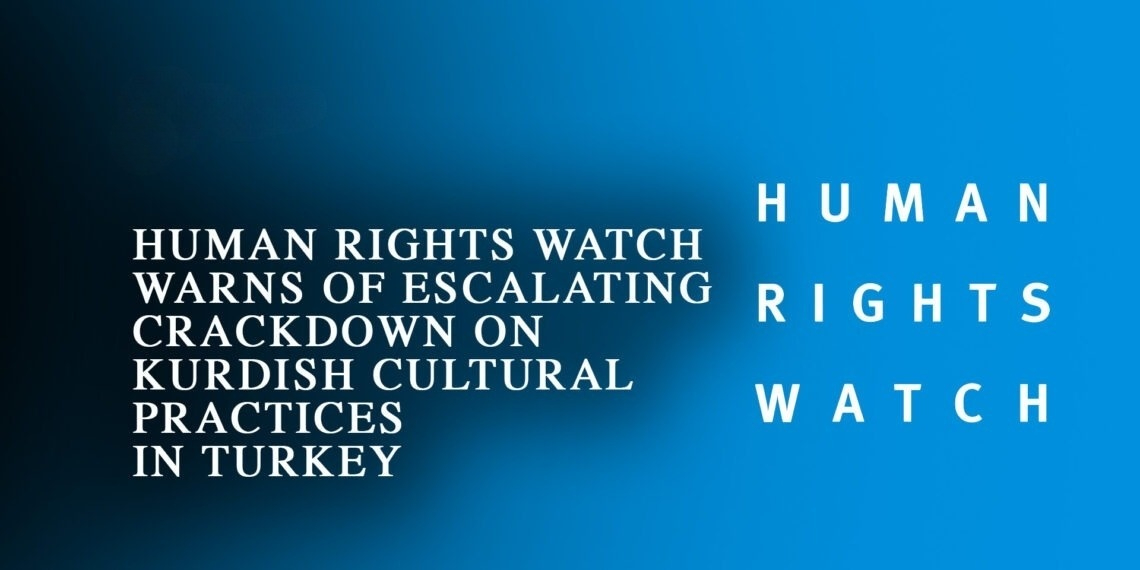Human Rights Watch has expressed grave concern over Turkey’s escalating crackdown on Kurdish cultural practices, describing recent actions as a serious abuse of the criminal justice system. They called on the Turkish authorities to stop these repressive measures and to respect cultural freedoms.

Human Rights Watch has raised concerns about the increasing criminalisation and repression of Kurdish cultural practices in Turkey. In an article published on Thursday, Emma Sinclair-Webb, associate director and Turkey director at Human Rights Watch, said that the Turkish authorities are systematically targeting legitimate Kurdish cultural activities. She warned that “turning Kurdish wedding parties into crime scenes by arresting and prosecuting guests and musicians is only the latest example of how, for decades, Turkish authorities have perverted the criminal justice system to target legitimate activities and political expression by Kurds”.
In one notable case, nine Kurdish youths in Mersin, southern Turkey, were arrested after a TikTok video showed them dancing to a Kurdish song and chanting slogans on a beach on 16 June. Although the video had been shared over a month earlier, the youths were formally arrested on 25 July, amid growing criticism that the charges were part of a wider campaign against Kurdish cultural expression. The detainees were reportedly subjected to psychological torture and forced to listen to the ultra-nationalist song ‘Ölürüm Türkiyem’ while in custody, a move widely condemned by rights groups as a deliberate act of intimidation.
Sinclair-Webb also highlighted the wider implications of these arrests, stating: “The actions of the authorities in detaining and criminalising people for such lawful activities is a clear abuse of arrest powers”. She added that the European Court of Human Rights has ruled that singing popular folk songs, shouting slogans or referring to the PKK is protected speech because these activities do not incite violence or pose an imminent danger to individuals.
The incident in Mersin is not an isolated one. In Bazîd district of Ağrı (Agirî), police raided a wedding party and arrested several people, including a musician, for allegedly ‘spreading terrorist propaganda’ through Kurdish songs and dances. Although some were released after interrogation, others were formally charged, highlighting the widespread surveillance and criminalisation of Kurdish cultural practices. In a separate case, Turkish police targeted several weddings in Hakkari (Colemêrg), a predominantly Kurdish province, detaining local musicians and some attendees on similar charges.
Protests erupted in response, with Kurdish activists and supporters rallying in various cities against what they see as a systematic attempt to suppress Kurdish culture.
The pro-Kurdish Peoples’ Equality and Democracy Party (DEM) also condemned the arrests, stressing that such actions were indicative of the ongoing war against Kurdish culture and language. The party warned that the criminalisation of cultural practices and the suppression of political expression could lead Turkey into dangerous waters and further deepen social divisions.
The crackdown extends beyond cultural events. In Istanbul, two Kurdish employees of an airport restaurant were reportedly sacked for speaking Kurdish at work, highlighting a worrying pattern of discrimination against Kurds in various sectors. This problem is exacerbated in Turkey’s prison system, where Kurdish inmates face increasing restrictions. Recently, the Şırnak (Şirnex) T-Type Closed Prison imposed harsh measures, including a ban on speaking Kurdish on the phone, a ban on hugging visitors and a ban on bringing essential items into the facility.
Human Rights Watch has called for an end to these repressive measures, the immediate release of those unjustly detained, and reforms to protect cultural freedoms in Turkey.








Leave A Comment